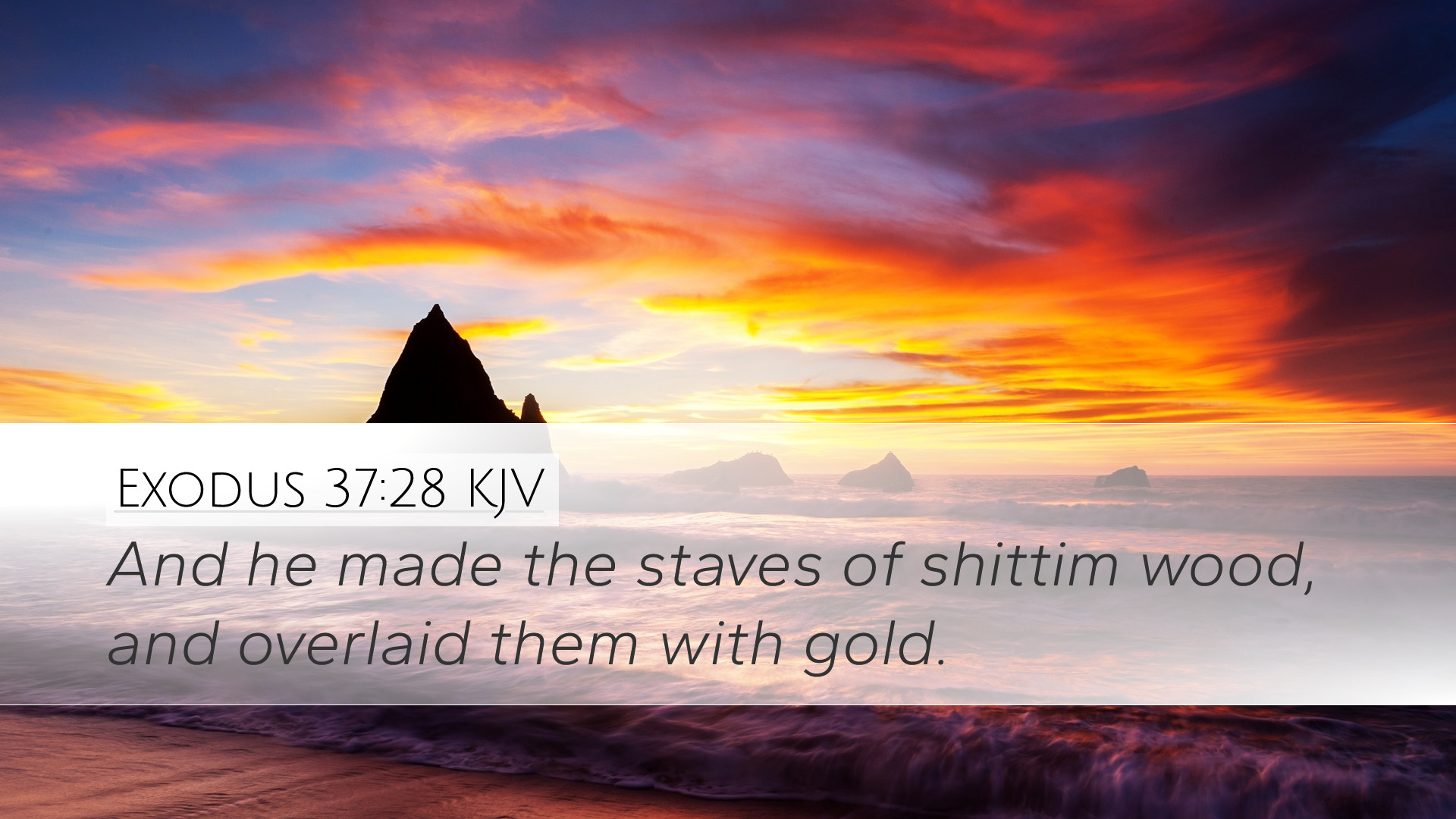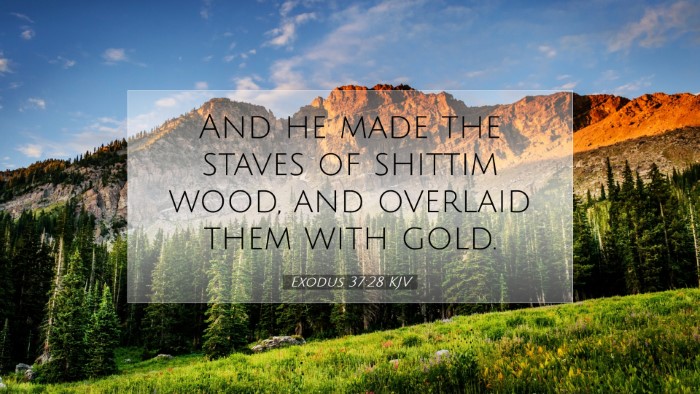Exodus 37:28 - Commentary Summary
Exodus 37:28 states:
"And he made the holy anointing oil, and the pure incense of sweet spices, according to the work of the apothecary."
This verse provides insight into the importance of the sacred elements used in the worship of God, specifically focusing on the formulation of the holy anointing oil and the pure incense. The commentaries below provide deeper theological reflections and practical applications.
Context and Background
The context of Exodus 37 is situated within the broader narrative of the construction of the Tabernacle, God's dwelling place among His people. Following the detailed instructions given in previous chapters, Bezalel and his craftsmen undertake the task of creating instruments essential for the worship of Yahweh. This verse highlights the careful craftsmanship required not merely for the Tabernacle's physical structure but also for the vital supplies used in its ministry.
Insights from Public Domain Commentaries
Matthew Henry's Commentary
Creation of Sacred Elements: Matthew Henry emphasizes the significance of the holy anointing oil and incense, noting their ceremonial roles in the sanctification of the priests and the Tabernacle. He suggests that these elements represent the presence of the Holy Spirit, making them not just symbolic but also practical in inviting God's presence into the worship experience.
God's Detailed Instructions: Henry also comments on God’s meticulous guidelines regarding these preparations. He points out that God's commandments are to be followed closely, reflecting the entirety of the Law. The specificity in the creation process underscores the holiness of God and serves as a reminder to believers of the sacred nature of worship.
Albert Barnes's Notes on the Bible
The Apothecary's Work: Barnes illuminates the term "apothecary," which refers to a skilled artisan in mixing fragrances and oils. This role is vital as it reflects both the artistry and reverence required in the preparation of sacred items. The blending of spices and oils does not simply indicate a formula; it symbolizes the blending of humanity’s devotion and the divine presence of God.
Purpose of Anointing: In his analysis, Barnes discusses the purpose of the anointing oil, stressing its use in consecrating priests and various items of the Tabernacle. He draws parallels with the New Testament, where the anointing signifies empowerment by the Holy Spirit. This connection encourages believers to seek spiritual anointing in their ministries today.
Adam Clarke's Commentary
Symbolism of Incense: Clarke provides a detailed examination of the incense, noting that it symbolizes the prayers of the people ascending to God. Just as the incense rose in the Tabernacle, so too do the prayers and worship of believers rise before God today. This raises the theological understanding of worship as an ongoing interaction between God and His faithful.
Importance of Purity: Clarke emphasizes the concept of purity in worship, which the incense exemplifies. The "pure incense of sweet spices" denotes the need for sincerity and sincerity's role in effective worship. The quality of worship, therefore, reflects the heart's condition before God, prompting reflection on the importance of personal holiness and devotion in a leader's life.
Theological Implications
This verse serves as a powerful reminder of the sacredness of worship. The detailed instructions for creating the holy anointing oil and incense imply that God desires worship that is not only heartfelt but also aligned with His holy standards. Each component points to significant theological truths:
- Holiness: The anointing oil and incense are meant to signify cleansing and sanctification, essential for approaching God.
- God's Presence: The practices instituted with these elements invite God's presence among His people, mirroring the New Testament's call for believers to be temples of the Holy Spirit.
- Devotional posture: The anointing and incense reflect the proper posture of worship, which is crucial for spiritual vitality and effectiveness in ministry.
Practical Applications
For pastors, students, theologians, and Bible scholars, the insights gleaned from Exodus 37:28 furnish several practical applications:
- Encouraging Reverent Worship: Understanding the significance of anointing and incense should lead to fostering environments of worship that honor God's holiness.
- Promoting Spiritual Renewal: Regular reflection on our own heart's condition, much like the purity of incense, can lead to a deeper spiritual renewal.
- Bridging Old and New Testament Insights: The continuity in the themes of anointing from Exodus to the New Testament enriches preaching and teaching about the work of the Holy Spirit.
Conclusion
Exodus 37:28 invites believers to reflect deeply on the significance of the materials and rituals established in worship. The commentaries from Matthew Henry, Albert Barnes, and Adam Clarke weave together a tapestry of understanding that emphasizes holiness, the importance of preparation, and the divine interaction inherent in worship. As modern-day believers seek to honor God in their lives, the lessons from this verse remain vital and applicable, reminding us that worship is not merely an act but a profound engagement with the divine.


